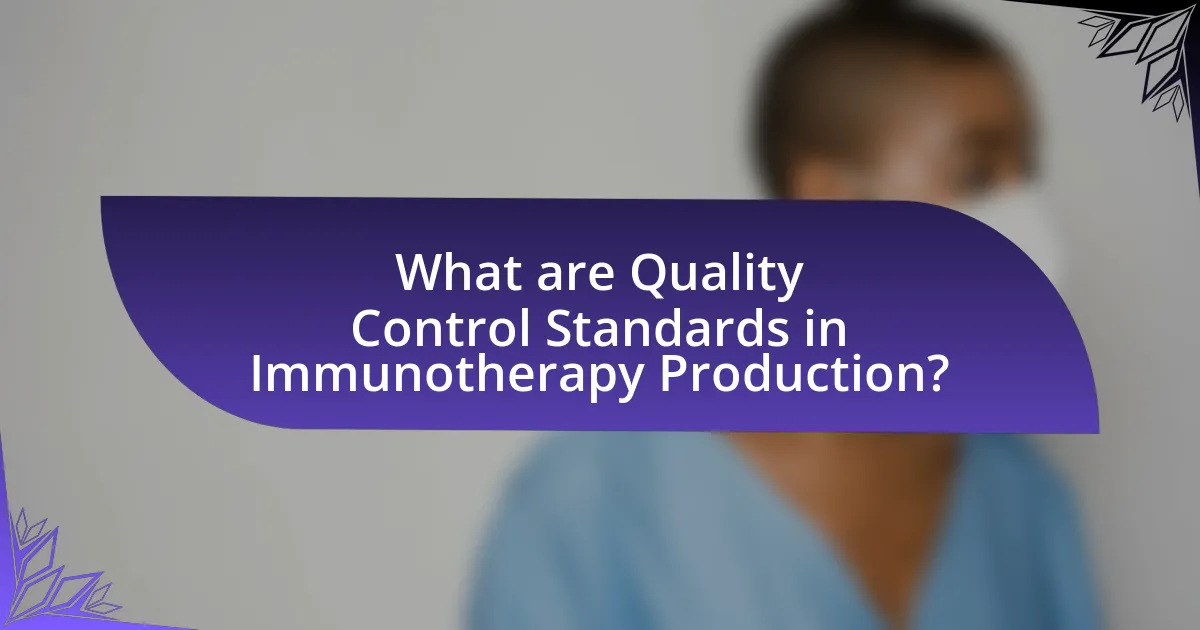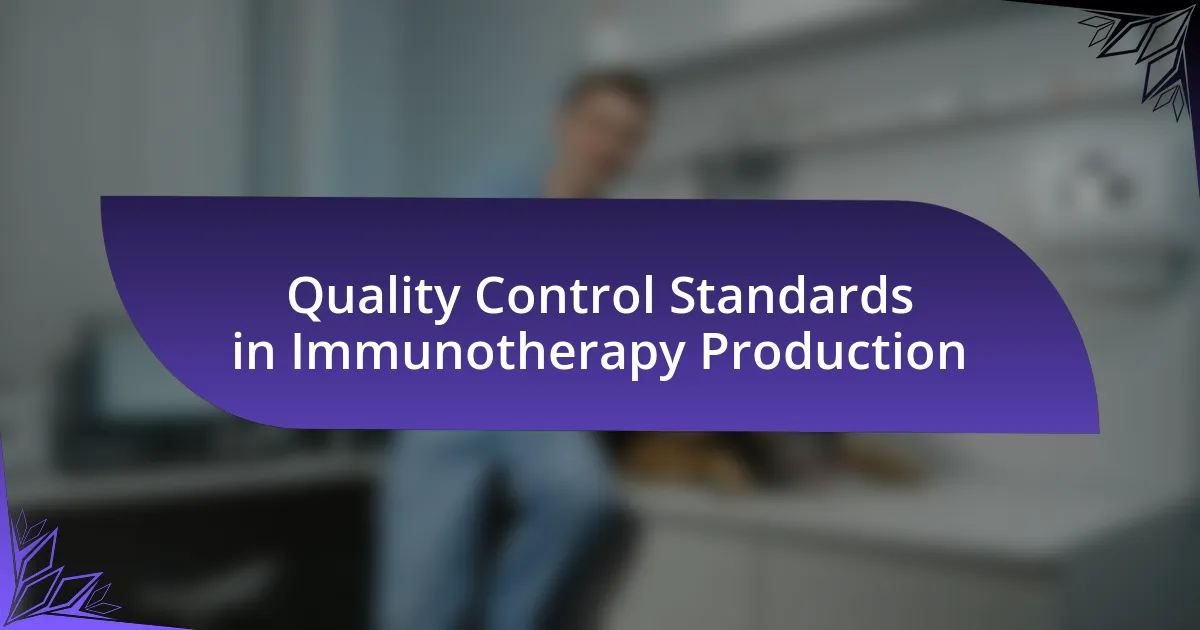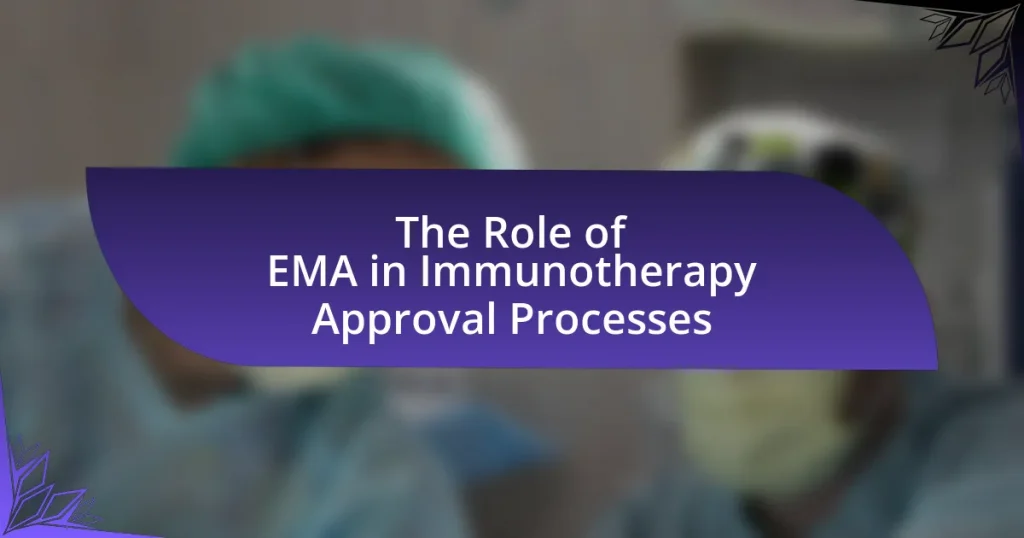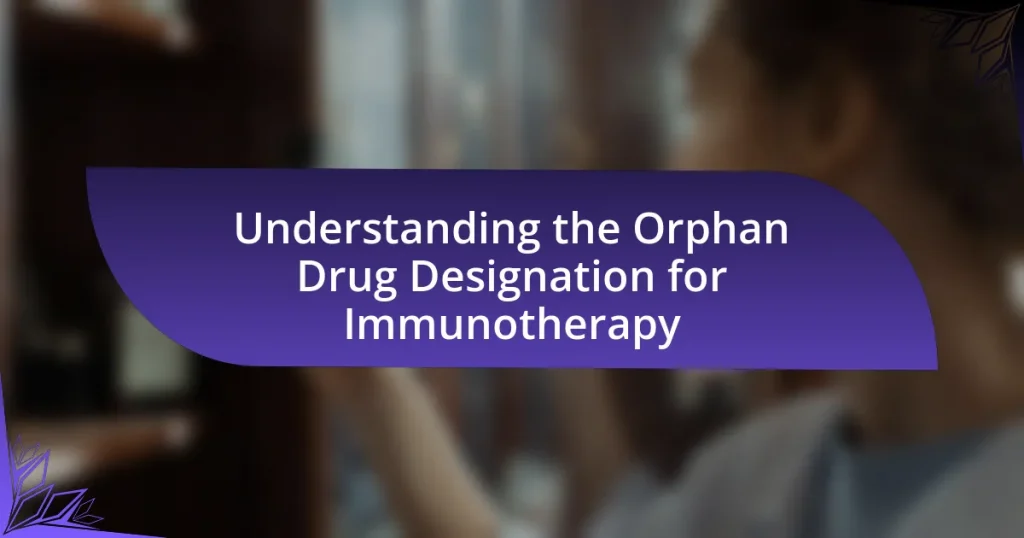Quality Control Standards in Immunotherapy Production are essential guidelines that ensure the safety, efficacy, and quality of immunotherapeutic products. The article outlines the critical components of these standards, including raw material testing, process validation, and final product testing, while emphasizing the importance of compliance with regulatory frameworks such as Good Manufacturing Practices (GMP) and guidelines from agencies like the FDA. It discusses the risks associated with inadequate quality control, the types of testing involved, and the role of staff training and technological advancements in maintaining high standards. Additionally, the article highlights challenges faced in quality control, best practices for effective implementation, and future trends that may influence these standards in the evolving landscape of immunotherapy.

What are Quality Control Standards in Immunotherapy Production?
Quality control standards in immunotherapy production are systematic guidelines and procedures designed to ensure the safety, efficacy, and quality of immunotherapeutic products. These standards encompass various aspects, including raw material testing, process validation, in-process controls, and final product testing. For instance, the International Conference on Harmonisation (ICH) guidelines and Good Manufacturing Practices (GMP) are critical frameworks that outline the necessary quality control measures. Compliance with these standards is essential to meet regulatory requirements and to ensure that the final product is free from contaminants and meets the specified potency and purity levels.
Why are Quality Control Standards essential in Immunotherapy Production?
Quality Control Standards are essential in Immunotherapy Production to ensure the safety, efficacy, and consistency of therapeutic products. These standards establish rigorous testing and validation processes that help identify and mitigate risks associated with the production of immunotherapies, which often involve complex biological materials. For instance, adherence to Good Manufacturing Practices (GMP) is mandated by regulatory agencies like the FDA, which requires that all immunotherapy products undergo extensive quality assessments to confirm their purity and potency. This is critical, as any deviations in quality can lead to adverse patient outcomes or treatment failures, underscoring the necessity of these standards in maintaining high-quality therapeutic interventions.
What risks are associated with inadequate Quality Control in Immunotherapy?
Inadequate Quality Control in Immunotherapy poses significant risks, including treatment ineffectiveness, patient safety concerns, and potential regulatory non-compliance. Treatment ineffectiveness can arise from the administration of improperly manufactured or formulated therapies, leading to suboptimal patient outcomes. Patient safety is compromised when contaminants or incorrect dosages are present, which can result in adverse reactions or severe health complications. Furthermore, failure to adhere to established quality standards can lead to regulatory actions, including product recalls or sanctions from health authorities, jeopardizing the credibility of the manufacturing entity. These risks underscore the critical importance of stringent Quality Control measures in the production of immunotherapy products.
How do Quality Control Standards ensure patient safety in Immunotherapy?
Quality Control Standards ensure patient safety in Immunotherapy by establishing rigorous protocols for the manufacturing, testing, and administration of immunotherapeutic products. These standards mandate comprehensive testing for potency, purity, and sterility, which are critical to preventing adverse reactions and ensuring the efficacy of treatments. For instance, the FDA requires that all immunotherapy products undergo extensive clinical trials to assess safety and effectiveness before approval, thereby minimizing risks to patients. Additionally, adherence to Good Manufacturing Practices (GMP) ensures that production processes are consistently monitored and controlled, further safeguarding patient health.
What are the key components of Quality Control Standards in Immunotherapy?
The key components of Quality Control Standards in Immunotherapy include product characterization, potency testing, safety assessments, and compliance with regulatory guidelines. Product characterization ensures that the immunotherapeutic agents are accurately defined in terms of their composition and structure, which is critical for efficacy. Potency testing evaluates the biological activity of the product to confirm that it meets the required therapeutic effects. Safety assessments involve rigorous testing for potential adverse effects, ensuring that the treatment is safe for patient use. Compliance with regulatory guidelines, such as those set by the FDA or EMA, ensures that all processes meet established safety and efficacy standards, thereby maintaining the integrity of the immunotherapy production process.
What types of testing are involved in Quality Control for Immunotherapy?
Quality Control for Immunotherapy involves several types of testing, including potency testing, purity testing, identity testing, and safety testing. Potency testing assesses the therapeutic effect of the immunotherapy product, ensuring it elicits the desired immune response. Purity testing evaluates the presence of contaminants or impurities, which is critical for patient safety and product efficacy. Identity testing confirms that the product is what it claims to be, often through techniques like mass spectrometry or PCR. Safety testing, including endotoxin testing and sterility testing, ensures that the product is free from harmful microorganisms and safe for administration. These testing types are essential to comply with regulatory standards and ensure the quality and effectiveness of immunotherapy products.
How do regulatory agencies influence Quality Control Standards in Immunotherapy?
Regulatory agencies influence Quality Control Standards in Immunotherapy by establishing guidelines and requirements that ensure the safety, efficacy, and quality of immunotherapeutic products. For instance, the U.S. Food and Drug Administration (FDA) mandates compliance with Good Manufacturing Practices (GMP), which dictate the necessary quality control measures throughout the production process. These regulations require rigorous testing and validation of immunotherapy products, including potency assays and stability studies, to confirm that they meet established standards before reaching patients. The FDA’s oversight ensures that any deviations from these standards are addressed, thereby maintaining the integrity of immunotherapy treatments and protecting patient health.
How are Quality Control Standards implemented in Immunotherapy Production?
Quality Control Standards in Immunotherapy Production are implemented through a systematic approach that includes rigorous testing, validation, and compliance with regulatory guidelines. These standards ensure that the production processes meet predefined specifications for safety, efficacy, and quality. For instance, the use of Good Manufacturing Practices (GMP) is mandated by regulatory bodies such as the FDA, which requires facilities to maintain strict controls over the production environment, equipment, and personnel. Additionally, quality assurance protocols involve continuous monitoring and testing of raw materials, in-process samples, and final products to detect any deviations from established quality benchmarks. This comprehensive framework is essential for maintaining the integrity of immunotherapy products, as evidenced by the successful approval of therapies like CAR-T cell treatments, which underwent extensive quality assessments before reaching the market.
What processes are followed to maintain Quality Control during production?
Quality control during production in immunotherapy involves several key processes, including raw material testing, in-process monitoring, and final product validation. Raw material testing ensures that all components meet predefined specifications before use, which is critical for maintaining the integrity of the final product. In-process monitoring involves continuous assessment of production parameters, such as temperature and pH, to ensure that the manufacturing process remains within established limits. Final product validation includes rigorous testing for potency, purity, and safety, often following guidelines set by regulatory bodies like the FDA or EMA. These processes collectively ensure that the immunotherapy products are safe and effective for patient use.
How is staff training integrated into Quality Control Standards?
Staff training is integrated into Quality Control Standards by ensuring that personnel are equipped with the necessary skills and knowledge to adhere to established protocols. This integration involves structured training programs that cover specific quality control procedures, regulatory requirements, and best practices relevant to immunotherapy production. For instance, organizations often implement continuous education and certification processes to keep staff updated on the latest quality standards and technologies. Evidence of this integration can be seen in regulatory guidelines from agencies like the FDA, which emphasize the importance of trained personnel in maintaining compliance and ensuring product safety and efficacy in the production of immunotherapies.
What challenges are faced in maintaining Quality Control Standards in Immunotherapy?
Maintaining Quality Control Standards in Immunotherapy faces several challenges, including variability in biological materials, complex manufacturing processes, and stringent regulatory requirements. Variability in biological materials, such as patient-derived cells, can lead to inconsistent product quality, making standardization difficult. The complex manufacturing processes, which often involve multiple steps and require precise conditions, increase the risk of errors and contamination. Additionally, regulatory requirements are continually evolving, necessitating constant updates to quality control protocols to ensure compliance. These factors collectively complicate the maintenance of high-quality standards in immunotherapy production.
How do technological advancements impact Quality Control in Immunotherapy?
Technological advancements significantly enhance Quality Control in Immunotherapy by enabling more precise monitoring and analysis of therapeutic products. Innovations such as high-throughput sequencing and advanced bioinformatics allow for the detailed characterization of cellular products, ensuring that they meet stringent safety and efficacy standards. For instance, the integration of automated systems in manufacturing processes reduces human error and increases reproducibility, which is critical in maintaining consistent product quality. Additionally, real-time analytics and machine learning algorithms facilitate the early detection of deviations in product quality, allowing for timely interventions. These advancements collectively contribute to a more robust Quality Control framework, ultimately improving patient outcomes in immunotherapy treatments.
What are common pitfalls in Quality Control practices for Immunotherapy?
Common pitfalls in Quality Control practices for Immunotherapy include inadequate validation of assays, lack of standardized protocols, and insufficient training of personnel. Inadequate validation can lead to unreliable results, as seen in studies where unvalidated assays produced inconsistent data, compromising patient safety. The absence of standardized protocols can result in variability in product quality, which has been documented in cases where different manufacturing sites produced inconsistent therapeutic outcomes. Additionally, insufficient training of personnel can lead to errors in execution, as highlighted by incidents where untrained staff mismanaged critical quality control processes, ultimately affecting the efficacy and safety of immunotherapeutic products.
How can organizations improve their Quality Control Standards in Immunotherapy Production?
Organizations can improve their Quality Control Standards in Immunotherapy Production by implementing robust validation processes and continuous monitoring systems. These measures ensure that all production stages meet regulatory requirements and maintain product integrity. For instance, adopting Good Manufacturing Practices (GMP) and conducting regular audits can identify potential deviations early, thereby minimizing risks. Additionally, utilizing advanced analytical techniques, such as high-performance liquid chromatography (HPLC) and mass spectrometry, enhances the detection of impurities and ensures the consistency of therapeutic products. Research indicates that organizations that integrate these practices can significantly reduce batch failures and enhance patient safety, as evidenced by a study published in the Journal of Immunotherapy, which found that adherence to stringent quality standards improved overall product efficacy and safety profiles.
What best practices should be adopted for effective Quality Control?
Effective Quality Control in immunotherapy production requires the adoption of standardized protocols, regular training, and comprehensive documentation. Standardized protocols ensure consistency in processes, which is critical for maintaining product quality. Regular training for personnel enhances their understanding of quality standards and procedures, reducing the likelihood of errors. Comprehensive documentation provides a clear record of processes and outcomes, facilitating traceability and accountability. According to the International Society for Cell & Gene Therapy, adherence to Good Manufacturing Practices (GMP) is essential for ensuring the safety and efficacy of immunotherapy products, underscoring the importance of these best practices in achieving effective Quality Control.
How can continuous monitoring enhance Quality Control in Immunotherapy?
Continuous monitoring enhances Quality Control in Immunotherapy by providing real-time data on product consistency and patient responses. This approach allows for immediate identification of deviations from established quality standards, enabling timely interventions to correct issues before they escalate. For instance, continuous monitoring can track biomarker levels and immune responses, ensuring that therapies are effective and safe. Studies have shown that implementing continuous monitoring systems can reduce variability in treatment outcomes and improve overall efficacy, as evidenced by a 2019 study published in the Journal of Immunotherapy, which demonstrated that real-time data analysis led to a 30% increase in patient response rates.
What future trends are expected in Quality Control Standards for Immunotherapy?
Future trends in Quality Control Standards for Immunotherapy are expected to focus on enhanced automation, real-time monitoring, and personalized medicine approaches. Automation will streamline processes, reducing human error and increasing efficiency in quality assessments. Real-time monitoring technologies, such as advanced analytics and machine learning, will enable continuous oversight of product quality throughout the manufacturing process. Additionally, the shift towards personalized medicine will necessitate more stringent and tailored quality control measures to ensure that therapies meet the specific needs of individual patients. These trends are supported by ongoing advancements in biomanufacturing technologies and regulatory frameworks that emphasize safety and efficacy in immunotherapy products.
How might regulatory changes affect Quality Control in the future?
Regulatory changes are likely to enhance Quality Control in immunotherapy production by introducing stricter compliance requirements and standardized testing protocols. These changes may lead to improved safety and efficacy of therapies, as regulatory bodies like the FDA and EMA increasingly emphasize data integrity and traceability in manufacturing processes. For instance, the FDA’s 21 CFR Part 820 mandates comprehensive quality system regulations that require manufacturers to establish and maintain quality control measures, ensuring that products meet specified requirements consistently. As regulations evolve, companies will need to adopt advanced technologies and methodologies, such as real-time monitoring and automated quality assessments, to comply with these enhanced standards, ultimately leading to higher quality products in the market.
What role will innovation play in evolving Quality Control Standards?
Innovation will play a critical role in evolving Quality Control Standards by introducing advanced technologies and methodologies that enhance accuracy and efficiency in immunotherapy production. For instance, the integration of artificial intelligence and machine learning can facilitate real-time monitoring and predictive analytics, allowing for quicker identification of deviations in product quality. Additionally, innovations such as automated testing systems and high-throughput screening methods can significantly reduce human error and increase throughput, ensuring that quality standards are consistently met. Research has shown that companies adopting these innovative approaches have seen improvements in compliance rates and product reliability, thereby reinforcing the importance of innovation in maintaining and evolving quality control standards in the field of immunotherapy.
What practical steps can be taken to ensure effective Quality Control in Immunotherapy Production?
To ensure effective Quality Control in Immunotherapy Production, implementing a robust quality management system is essential. This system should include standardized operating procedures (SOPs) for all production processes, ensuring consistency and compliance with regulatory requirements. Regular training for personnel on these SOPs is crucial to maintain high standards of practice.
Additionally, conducting thorough risk assessments at each stage of production helps identify potential quality issues early. Utilizing advanced analytical techniques, such as flow cytometry and mass spectrometry, allows for precise characterization of immunotherapeutic products, ensuring their safety and efficacy.
Moreover, establishing a comprehensive documentation process facilitates traceability and accountability, which are vital for compliance with Good Manufacturing Practices (GMP). Regular audits and inspections by internal and external bodies further reinforce adherence to quality standards, ensuring that any deviations are promptly addressed.
These steps collectively contribute to a systematic approach to Quality Control, enhancing the reliability and effectiveness of immunotherapy products.



